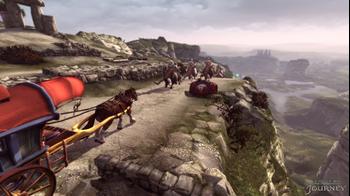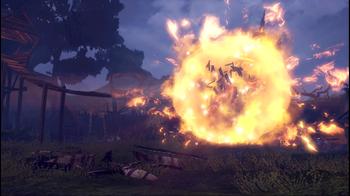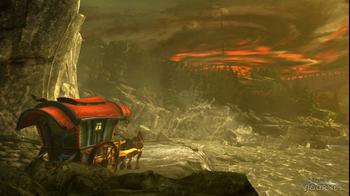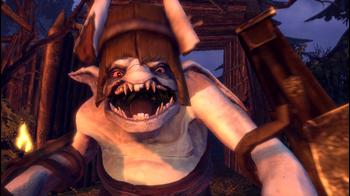
E3 2012: Fable: The Journey Developer Interview
Lionhead's Gary Carr has quite the illustrious career. After our interview I learned he was the brain behind the brilliant Theme Hospital, and that alone is enough to tell me that the studio is very safe with him in the role of Creative Director - one of the jobs Peter Molyneux filled before he stepped away to found a new independent company.
We grabbed Gary to chat to him about the magic systems of Fable: The Journey, morality systems, how life at Lionhead has been since Molyneux left and, of course, if the game is on rails or not. Fable: The Journey is due out exclusively for Kinect on Xbox 360 this October.
RPG Site: At a glance the game seems a fair bit different to what was shown last year. What’s changed?
Gary Carr: Well, it’s a year older - we’ve moved on a year! Nothing’s really changed from the original plan, but what we have now is far more mechanics that we’re actually allowed to show you this year. Mainly we want to show off the magic.
We’ve shown the horse before, you’ve seen the horse move around, and we’ve looked after the horse - pulled arrows out of the horse and healed it.
Now we’d like to show more of the thing that we think people are really going to enjoy playing around with, which is the magic system.
The big thing last year was the rails - and if they did or didn’t exist, something Peter [Molyneux] was rather fierce on. Can you explain now how movement works, and if the game is or isn’t on rails.
On the horse, you completely control the horse. It’s a fully analogue system. You can steer the horse and you can travel anywhere on the roads.
RPG Site: Full 360 degree control?
Carr: No. Not 360 degree - good point. It’s a linear story, it’s driving you forward because in the story you’re being chased by the corruption - you can’t go back. There’s no reason why we couldn’t go back on ourselves but we’re taking you through a story.
It’s not a full-on RPG - it’s not a game where you can kind of go anywhere like the other Fables - we’re taking you through a story, so it is driving you forward. But the game branches, and there’s parts of the game that you can discover or leave. There are side quests and optional quests that you can either stop and play through or choose to move on, so I think when Peter was talking about those things last year that’s what he means by freedom.
There are things that don’t feel right. One thing I didn’t want is for the player to just feel like a controller - where you’re just acting like a controller by moving your body in order to move around on foot. A lot of the on-foot sections we move you through the world, but you’re so busy playing with the magic system that’s where your concentration will be anyway.
RPG Site: A big thing for our readers is RPG mechanics. You mentioned this isn’t a full-on RPG, but are there still elements for those who came to Fable for the role-playing?
Carr: I’d say that this is an action-adventure rather than an RPG, really. We do have lots of RPG elements, though - you level up, we have collectables, you have a choice how to spend your experience. So if you’re spending your XP on certain spells you like you can advance those. Spells you don’t like you don’t need to advance, and that’ll change the abilities you have.
So it does still have RPG elements - the same goes for your horse, as well. You can upgrade your horse, you can make it faster, stronger, more obedient - if that’s the right term - you can spend XP strategically in the game. There is depth there, but it’s not what I’d call a conventional RPG. You’re not going through reams and reams and reams of gooey.
We will make those games again, but we think this is focused much more on the fun of playing with the magic.
RPG Site: Streamlining of the genre is general is something we’re seeing across the board, to be honest, so it’s good to hear you separate the two.
Carr: Yeah. It just felt right. It didn’t feel - it wasn’t a deliberate, deliberate strategy, but we just felt that - there’s so many things in the world for the player to experiment with that this time we just wanted to focus on that more.
Will fans of the series find important parts of the Fable fiction covered in this spin-off? Will it be important for the future of the franchise?
Oh, it is. It’s set fifty years after Fable III. We decided to focus a lot more on the story. Because it’s - as I said earlier - a linear experience - you’re not able to in this particular game customize your character. The character is a set character that evolves through the story.
What this allowed us to do was to give the Fable fans some more insight into some of the key characters and into some of the key places in the world of Albion that they perhaps wanted to know about.
For example, Theresa has been in all three Fable games - but we never really - the players never really knew much about her character. Why is she 500 years old, is she good, is she bad? We tell her story in this game.
Also, we explain what the Spire’s all about - so for the Fable fan they can find out a lot more about the world of Albion. This back-story was written ten years ago - we’re just now actually finally getting to tell it.
RPG Site: I take it you guys are all for leaving nice big juicy hooks for the future of the franchise, too?
Carr: Absolutely; this is just one part of the evolution of Fable and the Fable world. It doesn’t mean to say we won’t go back to doing some conventional, RPG, controller based games. We love controllers - it was just a fantastic opportunity to put you in the world.
That’s what we want you to do. When Kinect came along and we started playing with it back in November 2008 we just thought ‘Wow, imagine if you were in the world of Albion, what would you do?’
So we’ve gone to a first person viewpoint as it really feels natural to touch things in the world. In one sense you’re playing with magic, but other times you’re able to manipulate the world with your hands. It means you’re in the world and really feel like a hero much more than ever before.
RPG Site: Fable’s well known for its morality systems; are you including any of these traditional story points in this title?
Carr: We’ve always had moral choice. We’ve always had... y’know, people can play how they want to play. That’s a theme of not just Fable games but Lionhead games. We have choices in this game - they’re just different kinds of choices.
The way you play with your magic system, the way you treat your horse - that’s up to the individual. So the choice and the breadth comes with the way you become a hero in this game rather than making hard choices about becoming a good guy or a bad guy.
The story is more linear as I said, so you are a ‘good’ guy, but the choice is there instead in how you go about things - the way you play with magic, the way you bond with your horse and things like that. If you don’t want to care for your companion you don’t have to; you can just treat it as a meat vehicle through the world.
Some people we hope are gonna really bond with their horse, and there’s a key reason why we want them to do that. There’s a very important storyline surrounding the horse later in the game.
We just want to play with people to see who really cares about the horse after playing the game for fifteen hours - and then we’ll test them later on with an ultimate moral choice.
RPG Site: Were there any particular inspirations for this title? I think this build now has combat resembling a light gun game a bit, just with the added depth of the different spells.
Carr: Well, I wouldn’t necessarily say there were any direct inspirations, but we’re always aware of other people’s work, without a doubt. I wouldn’t say we would ever sit down and say ‘we’ll take this element from that game and this element from that game,’ but y’know we play games as much as anyone else out there.
It’s always good to revise and change and try things out. We don’t want the Fable franchise to become predictable, so I think it’s important to try different things out from time to time.
RPG Site: This is running on Unreal Engine - a first for Fable and for Lionhead. How did that work out for you? Also - the big thing about Kinect is it takes up quite a bit of processing power from the Xbox..
Carr: Yeah, it does.
RPG Site: So, how was it trying to push graphics whilst saving processing power for Kinect?
Carr: Yeah - I think Unreal is a massive advantage because it allows us to spend a lot of time on polish. So even though it’s great that people loved how Fable III looked, we built that engine from the ground up in two years and shipped a game. Half the time the artists were waiting for the engine to be optimized and finished before they can get on with doing the pretty stuff.
I think what we’ve lost in processing power from Kinect we’ve gained in time for the artists to actually build beautiful assets.
RPG Site: Our last question is an obvious one, I suppose - how’s life without Peter?
Carr: [Laughs] Congratulations for being the first person today to ask me about that! I was just saying to my Marketing Manager that nobody had asked me about Peter. Peter actually interviewed me today on Spike TV - and I took the opportunity to kiss him on the lips, so you can find that somewhere!
Peter works only three offices away from me. I’ve worked with him for 23 years, we’re friends - he’s doing some new things and he needs to do some new things. Lionhead is strong, Lionhead is still here; we’ll be here for another fifteen years.
That’s because a lot of the people who are there like myself have been around Peter and this company for years. We know how it works; Peter’s done a great job in setting Lionhead up, and we’re looking forward to the next era of Lionhead’s future.
RPG Site: So the very ‘Moly’ concepts of emotion, connection, empowering the player to change and shape a world - that stuff that lives on in Lionhead without him and will show in your future games?
Carr: Yeah, because - well, not just Lionhead games - I worked at Bullfrog before - I was the sixth member of Bullfrog so this is all in my DNA as well. Also the new CEO of the company Mark Webley - he’s his brother in law! That’s how close knit we are as a company!
I don’t think you’ll see major changes - I’m not quite a Molyneux when it comes to the PR side of things - so you can expect some more boring stuff for me, my sound bites won’t be quite as interesting or as newsworthy, but in general the games will remain very, very Molyneux-esque.




